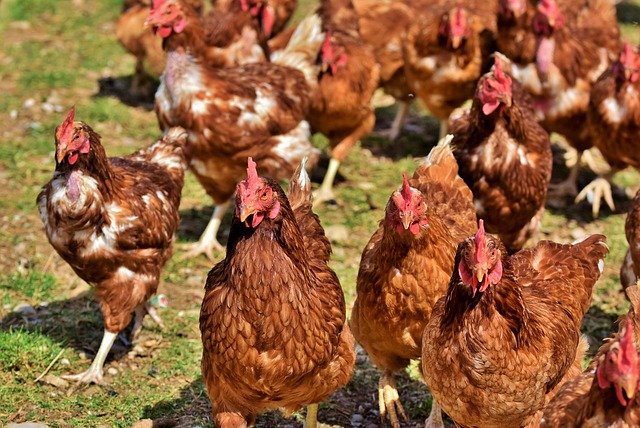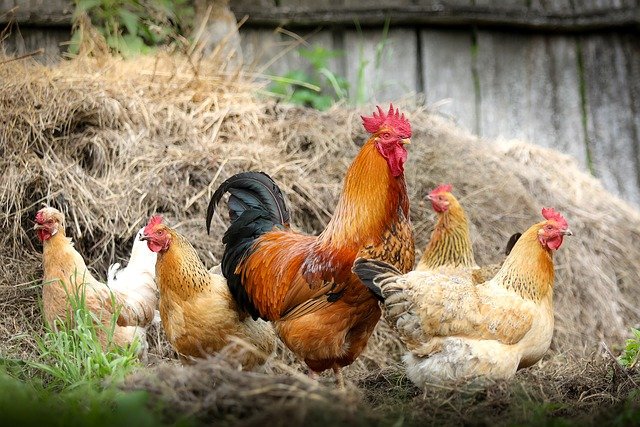Poultry farming in Uganda is known to be both lucrative and risky business especially if you do not know how to manage the poultry farm. Poultry farming in the country is a great contribution to the economy because of the high demand of the products both within the country and outside. Commercial poultry farming is on the rise due to the high profits that are obtained from the chickens. Chickens need proper management in order for the business to prosper. Take care of the chickens from feeding, housing management and vaccination.
 Starting a poultry farm in Uganda is not very hard as long as you keep in mind the type of market that you are targeting, that is either the local or international market or both. The largest percentage of the farmers doing poultry in the country carry out on a very low scale but if you are planning on doing poultry on a commercial level, then you need to learn how to market the different poultry products to the available market. Poultry is carried out for mainly three purposes and these are poultry for eggs, poultry for breeding and poultry farming for meat production.
Starting a poultry farm in Uganda is not very hard as long as you keep in mind the type of market that you are targeting, that is either the local or international market or both. The largest percentage of the farmers doing poultry in the country carry out on a very low scale but if you are planning on doing poultry on a commercial level, then you need to learn how to market the different poultry products to the available market. Poultry is carried out for mainly three purposes and these are poultry for eggs, poultry for breeding and poultry farming for meat production.
Poultry for meat production
different types of chicken breeds can be used for meat production in Uganda and the ones that are mostly reared in Uganda for the meat production include the broilers, kuroilers which have been recently introduced in the country and all the indigenous local breeds. The chicken reared for meat production is always ready at 8 to 12 weeks before they are ready.
Poultry for breeding production
some farmers rear the birds for breeding only and these are sold on the market after they mature.
Poultry for egg production
there are different chicken breeds that are reared for egg production and they can either be local breeds or layers. These are normally ready by 19 weeks and they can continue laying eggs till they are 78 weeks of age. Some of the breeds that are used for egg laying include the brown egg laying chicken (Lehman brown and gold brown) and these lay eggs with a brown outer shell, white egg laying chicken (Harvard white, Bovanch white and Isa white), these lay eggs with a white outer shell.
Poultry in Uganda is carried out using two methods and these are the inorganic and organic methods and these can both be used for commercial purposes. There is stiff competition between the inorganic and organic products from poultry although the organic products have a big and ready market since some people in the country are health conscious about the inorganic products.

Chicken breeds in Uganda
There are numerous breeds that are found in Uganda but the mainly reared ones are the layers for egg production and the broilers for meat production. There are also various local breeds that you can rear and one of them is known as kuroilers. These are close to the indigenous ones and they are good for both meat and egg production. You will need to know what you really want out of your poultry farm in order to get the best breeds for your farm.
Chicken Feeds In Uganda
The chickens need to be fed with highly nutritious foods so that they grow healthy and have a high competition on the market scene. You need to have a good quality feed and feed formulation that the birds require so that you can get good meat and egg production. The birds will need the following to be included in their feeds.
Carbohydrates
these are extremely essential for poultry birds as it provides energy to the birds especially if they have been starved for some time. The carbohydrates can be found in the grain products that are given to the birds.
Water
just like other animals chicken cannot live without water but can survive for a longer time without food, so make sure that the chickens have enough water all the time. Lack of enough water for the young chicks will hinder proper growth and it also leads to moulting in the egg laying chickens.
Vitamins
lack of vitamins leads to stunted growth from the young birds. The feeds should have vitamin B complex which helps in the growth of poultry chicks and to avoid curled toe paralysis. Make sure that you add adequate vitamin B in the food and it can be gotten from synthetic riboflavin, milk and greens. Vitamin A is also obtained from green feeds, fish ingredients and yellow corn. This protects the chicken birds from constant infections and colds. Vitamin D can be obtained from fish and synthetic products and it helps in preventing rickets and leg weaknesses in the chicken.
Fats
These can easily be obtained from other foods but you need to make sure that the fats mixed in the feeds is in a proper ratio to avoid complications in the birds for example if the fats are too much, the birds will get a digestive problem.
Proteins
this is a much needed nutrient for all the birds irrelevant of what they are being kept for but it is also the most expensive. The proteins can be got from two sources and these are plant and animal proteins and they are essential in the proper growth of the birds and they also increase the hardness of the egg shells.
The poultry feeds have a lot of ingredients included in them so that they can make up the much needed nutrients and these include:
-
Concentrates and balancers
-
By products of grain
-
Barley and wheat
-
Skim butter, milk and Rye
-
Millet and corn
When purchasing poultry feeds you need to make sure that you do not buy outdated feeds and for the commercial feeds, you need to buy the brands that are common on the market. The feeds come in three stages and these are stage 1 and 2 starter feeds and the grower feeds. The starter feeds are given to chicks which have just been hatched and when they make two weeks, the starter feeds 2 are given to them. When the chickens are about five to six weeks old, they get started on the grower feed.

Poultry Housing in Uganda
-
The poultry house should be waterproof and the inside should be able to keep the birds safe from the rain, hot sun and wind.
-
The poultry house should also be able to keep the birds safe from predators like snakes among others.
-
The temperature of the house for adult birds can be between 105 to 107 degrees Fahrenheit. You need to regulate the temperature in case it grows too cold or too hot.
-
It should be well ventilated.
-
Make sure that the feeders within the house are kept clean to avoid the spread of diseases and there should be proper management of litter.
Poultry diseases
There are several bird diseases that attack chicken and some of these include egg bound and cannibalism. The major types include the following:
Malnutritious disease
This is caused due to bad feeding of the chicken and it causes them to be malnourished. There are two types of Malnutritious diseases and these are the vitamin deficiency diseases which are caused by lack of enough vitamins and mineral deficiency diseases which are caused by lack of minerals in the feeds.
Contagious diseases
These are spread from the infected diseases to the healthy ones. There are three types of contagious diseases and these include:
Fungus diseases: these include fevus, micotoxicosis, thrash and aspergillosis are poultry fungal diseases and they are all spread through fungus.
Viral diseases: these are caused by different viruses and they include duck plague, chicken pox, Newcastle disease and Gumboro.
Bacterial diseases: these are caused by bacteria and examples of poultry bacterial diseases include cholera and pullorum.
Parasitic diseases
These are caused by parasites and some of the chicken diseases that are caused by parasites include steptocakich, coccidiosis, worms, lice and colibacilosis among others.

Benefits Of Poultry Farming Business
Things To Consider When Starting A Poultry Farming Business in Uganda
Market Research
Find local retailers, restaurants, and markets that buy chicken products.Compare your competitors’ prices.
Create a detailed business plan
Use your study to establish your target market, production targets, financial estimates, and marketing tactics. Your business plan will guide you and help you get financing.
Choose poultry farming
Choose from intensive, free-range, organic, or pasture-based poultry farming. Choose the strategy that fits your aims, resources, and market.
Finance
You may require financing to start your poultry farming business, depending on its size. Consider loans, grants, and family investments.
Location
Consider water, transportation, and zoning while choosing a poultry farm location.
Housing
Depending on your poultry farming strategy, you will need to build or buy a chicken house or shed to house your birds. Purchase feeders, waterers, and incubators to care for your chickens.
Start your flock with chicks or eggs. Buy disease-free chickens from a reliable provider.
Market your poultry products
Create a marketing plan. Consider direct sales, farmers’ markets, and retail or restaurant sales.
